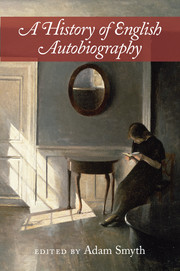Book contents
- Frontmatter
- Dedication
- Contents
- List of contributors
- 1 Introduction: The range, limits, and potentials of the form
- PART 1 AUTOBIOGRAPHY BEFORE ‘AUTOBIOGRAPHY’ (CA. 1300–1700)
- PART 2 RELIGION, GENDER, THINGS (CA. 1700–1800)
- PART 3 THE MANY NINETEENTH CENTURIES (CA. 1800–1900)
- PART 4 RELATIONAL LIVES AND FORMS OF REMEMBERING (CA. 1890–1930)
- 18 ‘Fusions and interrelations’: Family memoirs of Henry James, Edmund Gosse, and others
- 19 Queer lives: Wilde, Sackville-West, and Woolf
- 20 Anecdotal remembrance: Forms of First and Second World War life-writing
- 21 Experiments in form: Modernism and autobiography in Woolf, Eliot, Mansfield, Lawrence, Joyce, and Richardson
- 22 Psychoanalysis and autobiography
- PART 5 KINDS OF COMMUNITY (CA. 1930-CONTEMPORARY)
- Index
- References
22 - Psychoanalysis and autobiography
from PART 4 - RELATIONAL LIVES AND FORMS OF REMEMBERING (CA. 1890–1930)
Published online by Cambridge University Press: 05 March 2016
- Frontmatter
- Dedication
- Contents
- List of contributors
- 1 Introduction: The range, limits, and potentials of the form
- PART 1 AUTOBIOGRAPHY BEFORE ‘AUTOBIOGRAPHY’ (CA. 1300–1700)
- PART 2 RELIGION, GENDER, THINGS (CA. 1700–1800)
- PART 3 THE MANY NINETEENTH CENTURIES (CA. 1800–1900)
- PART 4 RELATIONAL LIVES AND FORMS OF REMEMBERING (CA. 1890–1930)
- 18 ‘Fusions and interrelations’: Family memoirs of Henry James, Edmund Gosse, and others
- 19 Queer lives: Wilde, Sackville-West, and Woolf
- 20 Anecdotal remembrance: Forms of First and Second World War life-writing
- 21 Experiments in form: Modernism and autobiography in Woolf, Eliot, Mansfield, Lawrence, Joyce, and Richardson
- 22 Psychoanalysis and autobiography
- PART 5 KINDS OF COMMUNITY (CA. 1930-CONTEMPORARY)
- Index
- References
Summary
In an essay of 1935 assessing the impact of Freud on modern culture, W. H. Auden pokes fun at current misconceptions of psychoanalysis: to ‘the man in the street, the cure for all ills is (a) indiscriminate sexual intercourse; (b) autobiography’ (Auden 1935, 69). Option (b) has certainly flourished in the age of psychoanalysis, notably in the great autobiographical novels of Freud's modernist contemporaries Joyce, Proust, Mann, Musil, and Svevo. Psychoanalysis actively produces autobiography in Svevo's La Coscienza di Zeno (Zeno's Conscience) (Svevo 1923:3), where the hero's analyst urges him to write his life story to get to the root of his smoking addiction, but then publishes this confession out of revenge when the patient abandons the analysis.
Svevo's satire seems to endorse Foucault's charge that psychoanalysis perpetuates the ‘immense and traditional extortion of the sexual confession’ enshrined in the Catholic Church, while adapting this ritual to a supposedly scientific framework (Foucault 1978, 65). Indeed, psychoanalysis and autobiography have abetted one another throughout the long century following Freud's Interpretation of Dreams (1900), itself an autobiographical work based on the author's self-analysis. Joseph Wortis recalls Freud's admission that ‘he was never analyzed himself: there was nobody to analyze him. “But I discovered analysis,” he said. “That is enough to excuse me”’ (Wortis 1954, 17). Freud's self-analysis could be seen as both cause and symptom of the autobiographical explosion that began with high modernism and still reverberates in today's popular culture, where memoirs regularly outsell fiction and TV viewers flock to the tell-all confessions of the Oprah Winfrey show.
This appetite for self-revelation goes back at least as far as the Romantics, with their celebration of the (usually male) individual, not for his typicality but for his uncommonness and strangeness. Commenting on this popular enthusiasm, Goethe writes, ‘We love only the individual; hence our enjoyment of all public self-expressions, confessions, memoirs, letters and anecdotes, even of unimportant persons’ (Reik 1949, ix). Psychoanalyst Theodor Reik quotes this aphorism in his own autobiography, Fragment of a Great Confession, whose title derives from Goethe's autobiography, where the author claims that all his works are ‘fragments of a great confession’ (Goethe 1987, 214). Likewise, Nietzsche affirms that every great philosophy is ‘the personal confession of its author, and a kind of involuntary and unconscious memoir’ (Nietzsche 1989, 5).
- Type
- Chapter
- Information
- A History of English Autobiography , pp. 313 - 328Publisher: Cambridge University PressPrint publication year: 2016

